- Home
- Clive Barker
Days of Magic, Nights of War Page 35
Days of Magic, Nights of War Read online
Page 35
“Which ones are they?” McBean called down to Candy.
“You can’t miss them,” Candy said, pointing. “My mom and dad are the two yelling at each other.”
Nothing, it seemed, had changed very much: her mother and father were indeed having a shouting match, their voices so loud and full of rage it was a wonder they weren’t audible in the Abarat. Candy’s mom was standing on the roof with Don, while her dad stood uneasily in a small rowboat (which was not painted red) with Ricky and several other passengers. Bill was clearly attempting to get his other son down into the boat, but Melissa wasn’t allowing him to go. The more enraged Candy’s father became, the more he rocked the boat, threatening to pitch the five other occupants of the little vessel into the churning waters. The presence of human food in the boat had attracted some interested fish; pop-eyed and stick snouted, they circled the trembling vessel like a flock of starving vampires outside a blood bank. Their presence was not lost on the people in the boat. One of them—a young man who worked in the garage where Candy’s dad took his truck when it broke down—was staring into the water, his panic rising.
“There are things down there!” he said. “Oh, God in Heaven, there are huge fishes! Sharks! There are sharks! There are sharks down there!”
The response from the rest of the passengers in the boat was much as might have been predicted: a chorus of shrieks, howls and prayers.
“We’ve got to be quick!” Candy hollered to McBean. “There’s mantizacs—”
“—in the water!” McBean prompted. “Yeah, I see them!”
“Tell your father to get everybody out of the boat!” Geneva called up to Candy. “Or somebody’s going to get hurt.”
“He won’t listen to me,” Candy said.
“Well, maybe he’ll listen to us!” John Mischief said.
He took up a position in the middle of the bow, and from there he and his brothers proceeded to harangue the passengers in a multiplicity of voices. Terrified though they were by the circling fishes, the spectacle of this little man leaning over the railing and ordering them to get off the boat before they were eaten alive certainly claimed their attention. Bill’s demands were drowned out completely by the noise of the Johns, and he gave up in frustration. He’d no sooner done so than one of the largest mantizacs Candy had ever seen appeared from the water close to the boat in which her dad was standing and assessed the smorgasbord on board. The human meal stared back at the fish with horror.
“Look at that damn thing!” yelled one of the survivors.
“Dad!” Ricky yelled. “Shoot it!”
Candy threw a panicked look at Finnegan, who cupped his hands around his mouth and yelled: “Don’t do that!”
Bill looked up at the man who had just addressed him and an expression of contempt came onto his face.
“You giving me orders?” he yelled back at Finnegan.
“Dad, it’s me! It’s Candy. He’s right. Don’t shoot it!”
It wasn’t her father who heard and answered her, however; it was her mother.
“Honey! You’re alive!”
“Get them out of the boat, Mom. Quickly! The fish’ll eat any boat that’s not red!”
“What’d she say?” Bill yelled. “Who the hell cares what color it is? Fish are color-blind!”
At which point three mantizacs disproved the contention by taking sizeable bites out of the offending boat. Fountains of water sprang up instantly, and the little vessel proceeded to sink. There was a chorus of panicked cries from all on board, silenced by Melissa, who yelled:
“Shut up and get back on this roof! Ricky, you first!”
Ricky didn’t need a second instruction. Every ounce his father’s son, he elbowed Miss Holloway, the old woman who lived on the corner of Followell Street, squarely in the stomach to prevent her from getting out first and leaped up onto the roof and into his mother’s arms. Cursing the boy in very un-Christian language, Miss Holloway clambered after him, followed by the other occupants of the sinking boat. Only Bill Quackenbush remained on board, still attempting to prove his marksmanship. He leveled his gun at one of the mantizacs that was chewing up the boat, and fired. At such a range he scarcely could have missed. The creature’s brutish head erupted in a cloud of blood and fish flesh. Bill whooped with glee, and he fired a second and third time.
“Is that your papa in that boat?” McBean said to Candy.
Candy nodded.
“You have my condolences,” the Captain said.
“You think he’s going to drown?”
“No, I just think he’s a damn fool,” the Captain replied. Then, after reassessing the situation, he said: “Actually, I think he is going to drown if he doesn’t get out of that boat double-quick!”
He’d no sooner spoken than the water started to slop over the sides of the little boat in which Bill Quackenbush stood. Candy watched the expression on his face change from delight to fear. Suddenly, for all his beer belly and his fierce expression, he looked like a little lost boy. That’s who he really is, Candy thought. He wasn’t the beer-slurred man sitting in front of the television; he was this forlorn figure standing in the chaos he’d made of his life, frightened and alone. All the anger she’d felt toward him over the years suddenly fell away. In its place there was a kind of dull sadness.
She looked at the people on the roof, who were much closer to her dad than she was, and to her horror she realized that none of them were intending to try and rescue him. Everybody, even Candy’s mom, was just staring in horror at the scene in front of them: Bill Quackenbush standing there in the sinking boat, the body of the mantizac he’d shot turning its pale belly up in the water; the other fish devouring it from all sides, churning up the waves in the frenzy.
“We have to get closer to him!” Candy told McBean.
“I’ll do my best!” the Captain yelled back, and steered the Lud Limbo through the crazed waters toward the little boat.
“Dad!” Candy called to him. “Get ready to jump!”
Her father’s situation was getting worse by the second. The boat was disappearing fast, while the fish, big and small, were becoming steadily more ambitious, even throwing themselves into the little vessel in order to attack him.
With great care the Captain nudged the Lud Limbo close enough that Bill could risk a jump. But for some reason he refused to move.
“Jump, Dad, jump!” Candy yelled.
But either out of terror or stubborn pride, Bill stayed in the little vessel.
“I’m going to get him,” Candy told Finnegan.
“There’s got to be some other way,” Finnegan said.
But Candy had already made up her mind. She clambered over the railing of the Lud Limbo, and without further word she launched herself into the air between the two boats. For a moment it seemed the current would carry the little boat out of reach and Candy would fall short, dropping into the fish-frenzied waters. But luck was on her side. A sudden surge caught the boat and brought it back in her direction. She landed, sprawling, in the small vessel. Fish flopped and jumped all around her.
“Well, aren’t you just the little hero?” said Bill Quackenbush to her.
“Heroine,” Candy replied.
“What?”
“Never mind.”
“You gonna try and force me to jump too?” he said. “’Cause I’m not gonna.”
“Don’t be dumb, Dad.”
“Don’t call me dumb!”
“You don’t want to be eaten alive any more than I do.”
“Maybe I should just jump and leave you here?” Bill said. “After all, you’re responsible for all this, aren’t you? Well? Aren’t you?”
Candy’s gaze slipped past her father toward the Wormwood. Her eyes grew wide with amazement.
“What are you lookin’ at?” Bill Quackenbush said. Getting no reply, he looked over his shoulder, following the line of his daughter’s gaze.
A staircase, which seemed to be made of dust and darkness, had appeared and wa
s growing and solidifying even as Candy and her father watched. And descending it, his arms spread in welcome to the girl in the sinking vessel below, was the Lord of Midnight.
Chapter 51
Into the Wormwood
BEHIND HER, CANDY HEARD her dad utter a string of curse words, fueled by the terror he felt at the sight of Christopher Carrion.
“You’re the father, I presume?” said Carrion as he approached, the stairs still being forged in the air ahead of him.
“Just leave him out of this!” Candy shouted.
“Why?” said Carrion. “Is he an innocent man? Somehow I doubt that. I think he’s cruel and vicious. Would that be about right, Quackenbush?”
“Go to hell.”
“Why don’t you get down on your knees to me, Quackenbush?”
“I don’t get on my knees to nobody.”
“Do you not?” Carrion raised his hand slowly.
“Don’t look at him, Dad!” Candy yelled.
But Bill had never taken a single piece of advice his daughter offered him, and he wasn’t about to start now. Almost in defiance of Candy, Bill stared directly into Carrion’s eyes. The Lord of Midnight smiled and closed his hand into a fist. Candy’s father let out a sob of helplessness. Then his legs bent double beneath him, driving him down to his knees among the fish dying at the bottom of the boat.
“There. That’s better,” said Carrion. He turned to Candy, smiling. “Doesn’t he look better that way?”
“Leave him alone!” Candy said.
Carrion looked back at Bill Quackenbush.
“Did you ever dream that your little daughter had such a rebellious spirit? No? Well, she does. In fact she’s caused a great deal of trouble for me and for my friends. You see that man up there on the deck? It’s all right, you can look.”
Bill looked, as did Candy.
“His name’s Kaspar Wolfswinkel,” Carrion went on.
It was indeed Wolfswinkel who was up there, with all his hats buckled onto his head to keep them from being blown off in the escalating winds.
“Now, your daughter has caused that poor man incredible inconvenience, as I’m sure she’d be the first one to tell you. But you’ll be pleased to hear that today’s the day when she pays for all her troublemaking.”
The staircase down which Carrion had been descending was touching the boat now, and Carrion had come to the bottom step. Suddenly he reached out, his reach uncannily long, as though his arms had suddenly grown to twice or three times their length, and caught hold of Candy.
“Say your good-byes,” he said to her.
Candy looked back at her father. She’d never seen an expression on his face like the one that he was wearing now. Confusion, anger and fear were all mingled together there. More than that, he seemed to be staring at his daughter as though he were seeing her for the first time; as though he couldn’t quite believe that she actually was his offspring.
From the roof of her house, Melissa began to yell to her husband: “BILLY! DO SOMETHING!”
But Bill Quackenbush was beyond responding. His frail imagination had cracked beneath the weight of all that he’d seen in the last few minutes. He was left with nothing to do but stare and gape and doubt his own sanity.
On the deck of the Wormwood, the man in the yellow suit was applauding as Carrion dragged Candy back up the stairs.
“Bring her up here!” he said, opening his arms. “Please. Bring her to me! I’ve waited a long time for this little reunion.”
On the roof of 34 Followell Street, Melissa watched in despair as the man with the death’s head and the sumptuous robes dragged her daughter up the spectral stairs and into the looming ship. Had she come so close to being reunited with Candy only to have the opportunity snatched away from her again? It was agonizing.
And to see her own husband standing idly by while the abduction took place! That was the final straw. If they survived this terrible day, Melissa thought, she would file for divorce as soon as she could find a dry lawyer.
There was only one tiny comfort to be had from these calamitous events: that it proved once and for all that the visions and the dream memories she’d had concerning the night Candy had been born were not her mind’s crazed invention. There was a greater story here, of which she had glimpsed only a fragment: the daughter she’d known simply as Candy for all those years was somebody more. Part of a mystery she did not yet understand. Perhaps never would.
From the deck of the Wormwood Candy glanced back down at her mother—as though she sensed Melissa’s stare. Then the Lord of Midnight pulled her away from the railing, and they both disappeared from sight, into the mystery of the ship.
Finnegan was the first into action. He flung himself off the Lud Limbo and landed on the stairs, which Carrion had ascended.
“Come on! Let’s get up there before these stairs disappear!”
The rest of the gang were quick to pursue him, picking up whatever they could find by way of weapons and racing up the steep stairway in pursuit of their leader.
“Be ready!” Finnegan warned them as they entered the ship. “He knows we’re coming after him.”
They’d no sooner boarded the Wormwood than there was a yell from Carrion, which brought a ragged chorus of cries out of the bowels of the ship.
“I don’t like the sound of that,” Deaux-Deaux said.
“We have to do this fast,” Finnegan said. “Let’s find Candy and get her out of this damnable place.”
There was no further discussion. They went straight to the hold and threw it open. The grotesque results of Mater Motley’s and her sisters’ labors were waiting there, in all their horrible glory. Loosing a cacophony of shrieks and screams and caterwaulings, they poured out of the hold like a flood from a broken sewer pipe: stinking and repugnant.
They were not all human, not remotely. Some were huge: one a hybrid spider, its legs decorated with colored barbs and a woman’s head set on its thorax; another a spine on which a hundred arms were sewn, like the limbs of a millipede, and at both ends raw wounds of mouths. Some were small: like crazed crabs, or eels with the heads of dolls. But whatever their size or shape, they were possessed by the same relentless rage. They shrieked and roared and chattered, dirtying the air with their obscenities.
There seemed to be no leader among them, nor strategy: they simply attacked. In a matter of seconds, the deck of the Wormwood was awash with mud and blood.
Finnegan fought his way through the battle to the wheelhouse, calling Candy’s name every step of the way. There was no answer, however, nor any sign of her, which was troubling. He seized a round, ragged stitchling who was hanging upside down from the rigging, spitting on those below, and put the clean edge of his sword to its sewn-up throat.
“Where’s the lady?” he demanded.
The creature giggled like an excited hyena. Finnegan pushed the blade into the stitchling’s fabric. A little arc of Todo mud spurted from the spot. “Tell me, filth,” he said, “or so help me, I’ll cut your stitches. Where did Wolfswinkel take the girl?”
The creature spat at him. Finnegan wiped the foul spittle from his face and pushed the blade a little deeper. More mud spurted. “All right! All right!” the stitchling said. “She was taken below. But you’re not going to save her.”
Finnegan withdrew his sword and was turning his back on the creature when he saw it pull a blade out of its pocket. He swung around on it, and with one swift motion he separated its head from its neck. The head hit the deck, still giggling, and rolled away under the feet of Geneva and a spider woman, who were locked in combat. Nearby, McBean, Tom and Deaux-Deaux were fighting a quartet of fiends whose heads were in their bellies. Mischief, meanwhile, had clambered up into the rigging where he was stabbing at a triple-horned monstrosity, which swung from the foresail with its claws hooked into the canvas and attacked the brothers with its venomous tail.
Nobody was having an easy time of it. But it was Malingo who was in the most imminent danger. As soon as he’
d come aboard, he’d found himself surrounded by several of Mater Motley’s seamstresses. Wielding their lethal needles, they had cornered him.
“We know who you are!” one of them spat.
“Giving aid to the enemy, weren’t you?”
“Geshrat filth.”
“Kaspar told us all about you,” said the woman closest to him, pricking his arm with her needle. “You’re his little slave.”
“Well, I’m not anymore.”
“Once a slave, always a slave,” said the woman, poking him again with her needle.
“No!” he said, knocking her hand away.
“How dare you touch me, slave,” the woman seethed. “Prick him to death, sisters! First the eyes! Then the heart!”
Surrounded with needles, Malingo ransacked his memory for some defense against them. He threw back his head, staring up into the mass of ropes, sails and timbers. A spell! Quickly; something powerful—
Yes! A few words came into his head that might do the trick. They were from one of Wolfswinkel’s grimoires, The Testament of the Ninth Palamuudian. He spoke it out, toward the heights of the ship; to the canvas and the rope.
“Come, unloving stuff.
Take life,
Take life!
From this—”
He blew into his hand, and threw the breath up into the rigging—
“And this!”
He blew again, and threw—
“Take life!”
“What do you think you’re doing, geshrat?” said one of the women, her voice oozing contempt. “Too late to be clever.”
Malingo ignored her. He just kept staring up into the sails.
“Look at me!” the woman said.
Still he ignored her.
She slapped him hard across the face.
“I said, look at me, slave!”

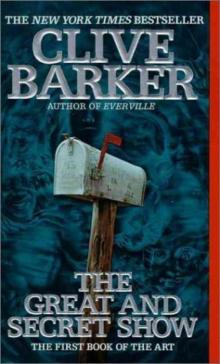 The Great and Secret Show
The Great and Secret Show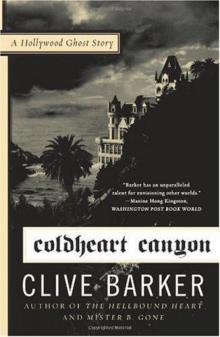 Coldheart Canyon: A Hollywood Ghost Story
Coldheart Canyon: A Hollywood Ghost Story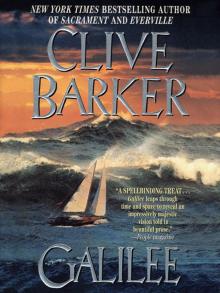 Galilee
Galilee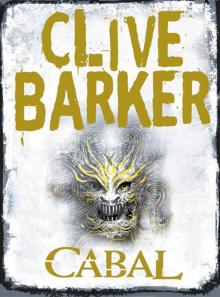 Cabal
Cabal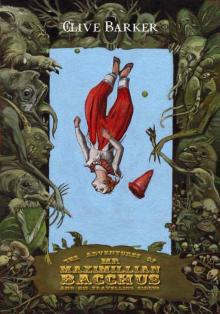 The Adventures of Mr. Maximillian Bacchus and His Travelling Circus
The Adventures of Mr. Maximillian Bacchus and His Travelling Circus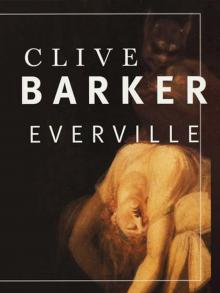 Everville
Everville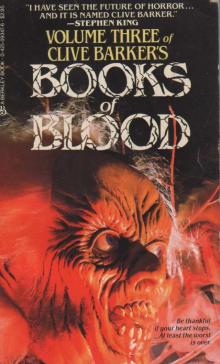 Books of Blood: Volume Three
Books of Blood: Volume Three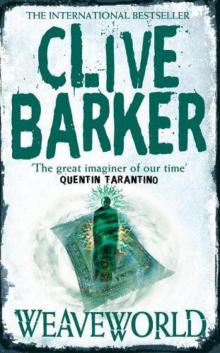 Weaveworld
Weaveworld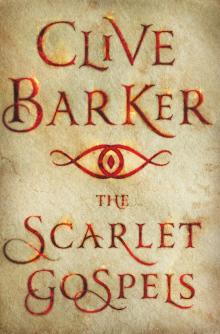 The Scarlet Gospels
The Scarlet Gospels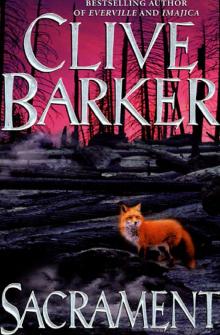 Sacrament
Sacrament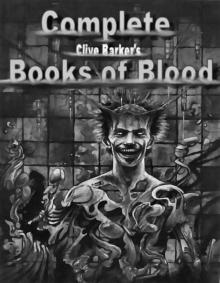 Books of Blood: Volumes 1-6
Books of Blood: Volumes 1-6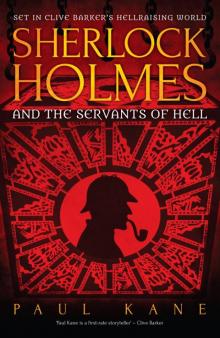 Sherlock Holmes and the Servants of Hell
Sherlock Holmes and the Servants of Hell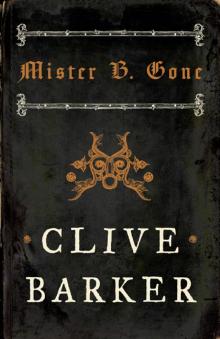 Mister B. Gone
Mister B. Gone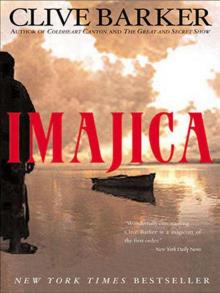 Imajica
Imajica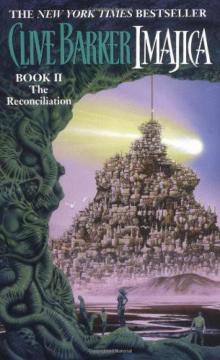 The Reconciliation
The Reconciliation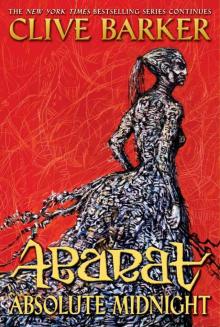 Abarat
Abarat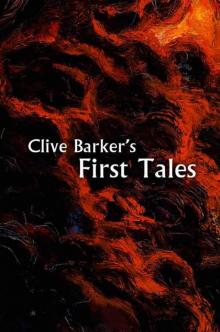 Clive Barker's First Tales
Clive Barker's First Tales The Hellbound Heart
The Hellbound Heart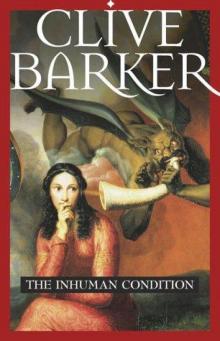 The Inhuman Condition
The Inhuman Condition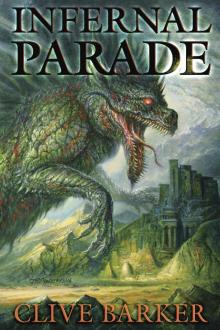 Infernal Parade
Infernal Parade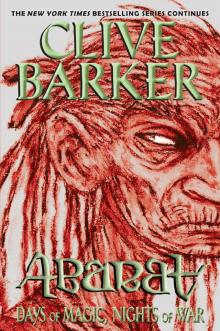 Days of Magic, Nights of War
Days of Magic, Nights of War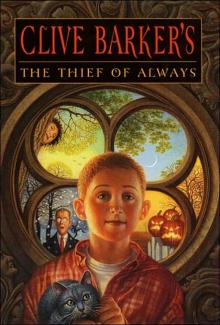 The Thief of Always
The Thief of Always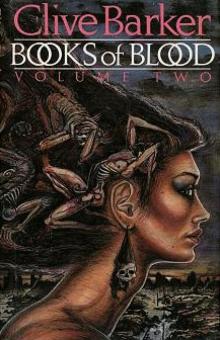 Books of Blood Vol 2
Books of Blood Vol 2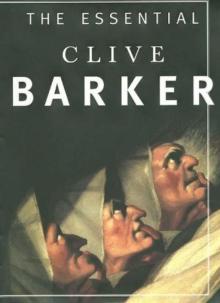 The Essential Clive Barker
The Essential Clive Barker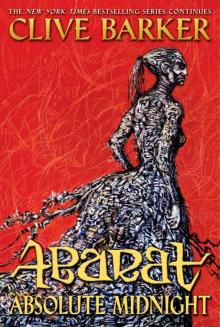 Abarat: Absolute Midnight a-3
Abarat: Absolute Midnight a-3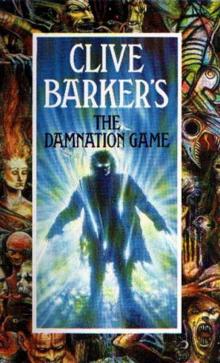 The Damnation Game
The Damnation Game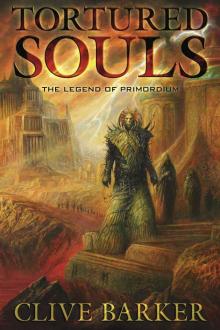 Tortured Souls: The Legend of Primordium
Tortured Souls: The Legend of Primordium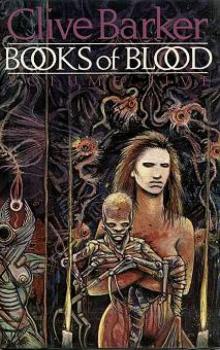 Books of Blood Vol 5
Books of Blood Vol 5 Imajica 02 - The Reconciliator
Imajica 02 - The Reconciliator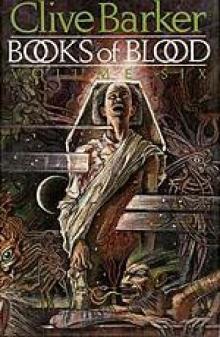 Books Of Blood Vol 6
Books Of Blood Vol 6 Imajica 01 - The Fifth Dominion
Imajica 01 - The Fifth Dominion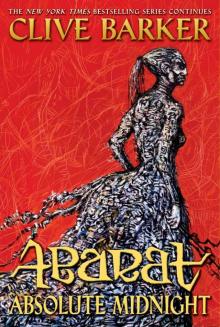 Abarat: Absolute Midnight
Abarat: Absolute Midnight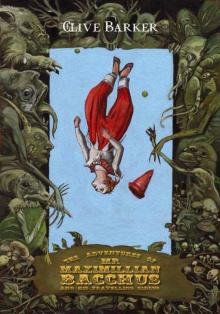 The Adventures of Mr. Maximillian Bacchus & His Traveling Circus
The Adventures of Mr. Maximillian Bacchus & His Traveling Circus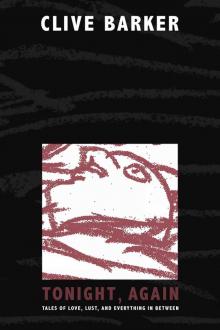 Tonight, Again
Tonight, Again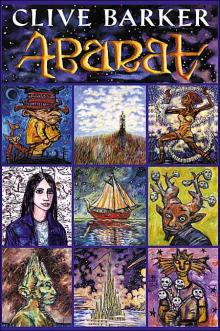 Abarat: The First Book of Hours a-1
Abarat: The First Book of Hours a-1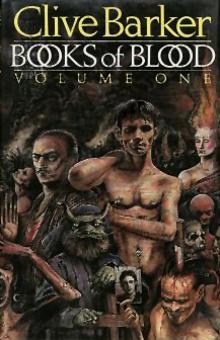 Books Of Blood Vol 1
Books Of Blood Vol 1 Age of Desire
Age of Desire Imajica: Annotated Edition
Imajica: Annotated Edition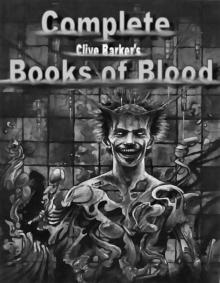 Complete Books of Blood
Complete Books of Blood Gutted: Beautiful Horror Stories
Gutted: Beautiful Horror Stories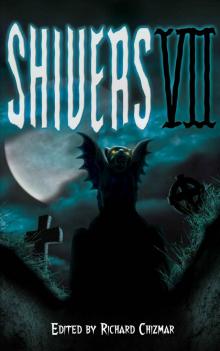 Shivers 7
Shivers 7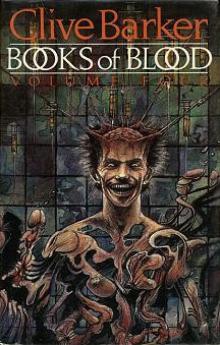 Books Of Blood Vol 4
Books Of Blood Vol 4